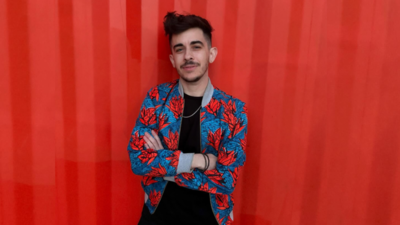[ad_1]

Chase Strangio, an attorney with the American civil liberties union (ACLU), is set to make history this week as the first known transgender lawyer to argue before the US Supreme Court, with just a 15-minute argument.
Strangio, 42, will present his case in United States v Skrmetti, a high-profile dispute over Tennessee’s controversial ban on gender-affirming care for minors, as reported by CNN.
Who is Chase Strangio?
Raised in Massachusetts, Strangio has been a prominent figure in civil rights law since joining the ACLU in 2012. He has been involved in several landmark victories, including the fight for marriage equality and the 2020 supreme court decision that protected LGBTQ employees from workplace discrimination. Strangio’s work has focused on expanding civil rights protections for transgender people, especially in areas like healthcare.
His personal connection to the case he’s arguing strengthens his advocacy. As a transgender man, Strangio has directly benefited from gender-affirming care. “It is not lost on me that I will be standing there at the lectern at the supreme court in part because I was able to have access to the medical care that is the very subject of the case that we’re litigating,” he said, acknowledging the stakes for those affected by the ruling.
“As a younger person struggling with my own queer and transness, it was a hard place to imagine myself,” he said. “It’s taken me time to find my way,” he added.
‘United States v Skrmetti’
The supreme court will decide whether Tennessee’s law, which prohibits treatments such as hormone therapy and puberty blockers for transgender minors, violates the Constitution’s Equal Protection Clause. The ruling could set a precedent with far-reaching implications for civil rights in the United States.
A decision striking down the ban could empower advocates to challenge similar laws targeting transgender individuals across the country. Conversely, upholding the law could encourage more Republican-led states to pass such measures.
Tennessee is one of over 20 states that have enacted similar bans. Supporters of the laws argue that gender-affirming care is too important a decision for minors, similar to restrictions on marriage or legal contracts.
However, major medical associations, including the American medical association and the American academy of paediatrics, affirm that such care is appropriate for minors experiencing gender dysphoria, citing reduced suicide risks among trans youth as evidence of its necessity.
Families waiting for the judgment
While Strangio focuses on his arguments, families like Alexis’s are left grappling with the real-life consequences of the case. Alexis, a Tennessee mother of a 10-year-old transgender girl, says the uncertainty is overwhelming.
“We were not excited to hear that the supreme court agreed to hear the case,” she said. “It made me very nervous because (the ruling) would be such a final decision for everyone in this state and set a precedent for so many other states.”
Fearing the worst, Alexis has already consulted doctors in California about starting her daughter on puberty blockers. If Tennessee’s law is upheld, she plans to leave the state altogether. For now, she focuses on shielding her child from the weight of these legal battles. “She’s not ashamed of being trans … we’re just trying to hold on to that as long as possible”, Alexis said.
Gender affirming care
Gender-affirming care has become a divisive issue in American politics, often linked to wider cultural debates. Supporters of the bans say they protect children, while opponents argue they violate parents’ rights and the civil liberties of trans youth.
The stakes are compounded by former President Donald Trump’s re-election and his vocal opposition to trans rights. This political backdrop fuels fear among advocates like Dr Izzy Lowell, whose telehealth practice serves trans patients. “It’s absolutely devastating for patients and families, and it’s just so misguided,” she said.
Strangio prepares to address the justices, he acknowledges the gravity of his role. The supreme court, he said, represents both a bastion of power and a symbol of historical exclusion.
“Civil rights in this country have been hard-won thanks in part to lawyers who fervently believed in the promise of America,” he noted. “I think about all of the arguments that have been held in the supreme court over just the basic dignity of people. That is part of our history—this is part of that history,” he said.
[ad_2]
Source link



